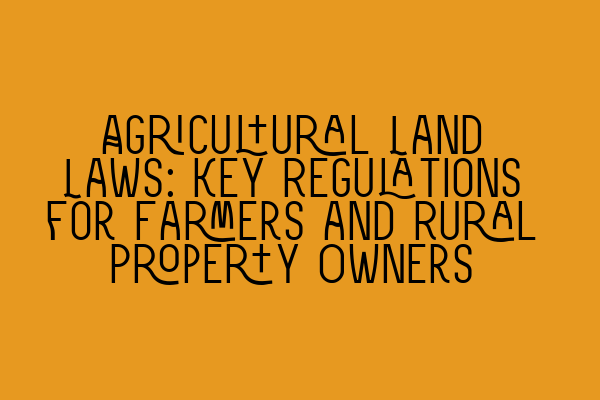Agricultural Land Laws: Key Regulations for Farmers and Rural Property Owners
Welcome to SQE Property Law & Land Law, a leading firm specializing in property law and land law matters. In this blog post, we will discuss the key regulations that farmers and rural property owners should be familiar with when it comes to agricultural land. Understanding these regulations is crucial for ensuring compliance and protecting your property interests.
1. Agricultural Holdings Act 1986: This act governs the relationship between landlords and tenants in relation to agricultural land and tenancies. It provides statutory protection for agricultural tenants and outlines their rights and responsibilities. Familiarize yourself with the provisions of this act to ensure a smooth landlord-tenant relationship. For more information on contract law, you can take advantage of our Interactive SQE Mock Tests for Contract Law.
2. Agricultural Tenancies Act 1995: This act introduced the concept of Agricultural Holdings Act tenancies, providing tenants with security of tenure and the right to compensation for improvements made to the property. It also sets out procedures for rent reviews and termination of tenancies. Stay updated with the regulations outlined in this act to ensure your rights are protected as a tenant.
3. Basic Payment Scheme (BPS): The BPS is a subsidy scheme that provides financial support to farmers and rural property owners. It is governed by the Common Agricultural Policy (CAP) and aims to support agricultural activities while promoting environmental sustainability. Make sure you are aware of the eligibility criteria and compliance requirements to benefit from the BPS. For more insights and guidance on contract law, we invite you to join our SQE Contract Law Webinars.
4. Environmental Stewardship Scheme: This scheme encourages farmers and landowners to adopt environmentally friendly practices on their agricultural land. By participating in this scheme, you can receive financial incentives and support for activities such as wildlife conservation and habitat restoration. Stay informed about the requirements of this scheme to maximize the benefits it offers.
5. Planning and Development: Any proposed changes to agricultural land, such as building new structures or changing land use, may require planning permission. Familiarize yourself with the planning regulations and procedures to ensure compliance and avoid legal issues. Understanding contract law reforms is equally important, and you can find an insightful analysis of recent changes in our article on Contract Law Reforms.
6. Rights of Way: Agricultural land often includes public footpaths, bridleways, and other rights of way. It is essential to understand the implications of these rights of way on your land, including access rights and maintenance responsibilities. Stay informed about your rights and responsibilities as a landowner to prevent any potential disputes.
7. Environmental Regulations: As a farmer or rural property owner, you must comply with various environmental regulations related to agricultural activities. These regulations include waste management, water quality, pesticide usage, and animal welfare. Stay updated with any changes to these regulations and ensure compliance to avoid penalties or legal complications. For more information on parties’ rights and responsibilities in a contract, refer to our article on Parties in a Contract: Rights and Responsibilities.
By familiarizing yourself with these key agricultural land laws and regulations, you can protect your property interests and ensure compliance with legal requirements. Remember to seek legal advice or consult professionals when dealing with complex legal matters to ensure the best outcomes for your agricultural business or rural property. For a comprehensive guide on the importance of ethics in contract law, you can refer to our article on The Importance of Ethics in Contract Law.
We hope you found this blog post informative and useful. If you have any further questions or require legal assistance with agricultural land laws or any other property law matters, please do not hesitate to contact us. Our team of experienced solicitors is ready to assist you.
